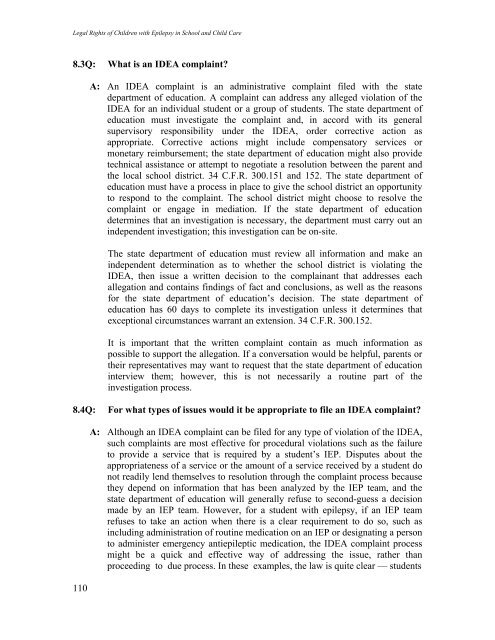Legal Rights of Children with Epilepsy in School & Child Care
Legal Rights of Children with Epilepsy in School & Child Care
Legal Rights of Children with Epilepsy in School & Child Care
Create successful ePaper yourself
Turn your PDF publications into a flip-book with our unique Google optimized e-Paper software.
<strong>Legal</strong> <strong>Rights</strong> <strong>of</strong> <strong><strong>Child</strong>ren</strong> <strong>with</strong> <strong>Epilepsy</strong> <strong>in</strong> <strong>School</strong> and <strong>Child</strong> <strong>Care</strong><br />
8.3Q:<br />
What is an IDEA compla<strong>in</strong>t?<br />
A: An IDEA compla<strong>in</strong>t is an adm<strong>in</strong>istrative compla<strong>in</strong>t filed <strong>with</strong> the state<br />
department <strong>of</strong> education. A compla<strong>in</strong>t can address any alleged violation <strong>of</strong> the<br />
IDEA for an <strong>in</strong>dividual student or a group <strong>of</strong> students. The state department <strong>of</strong><br />
education must <strong>in</strong>vestigate the compla<strong>in</strong>t and, <strong>in</strong> accord <strong>with</strong> its general<br />
supervisory responsibility under the IDEA, order corrective action as<br />
appropriate. Corrective actions might <strong>in</strong>clude compensatory services or<br />
monetary reimbursement; the state department <strong>of</strong> education might also provide<br />
technical assistance or attempt to negotiate a resolution between the parent and<br />
the local school district. 34 C.F.R. 300.151 and 152. The state department <strong>of</strong><br />
education must have a process <strong>in</strong> place to give the school district an opportunity<br />
to respond to the compla<strong>in</strong>t. The school district might choose to resolve the<br />
compla<strong>in</strong>t or engage <strong>in</strong> mediation. If the state department <strong>of</strong> education<br />
determ<strong>in</strong>es that an <strong>in</strong>vestigation is necessary, the department must carry out an<br />
<strong>in</strong>dependent <strong>in</strong>vestigation; this <strong>in</strong>vestigation can be on-site.<br />
The state department <strong>of</strong> education must review all <strong>in</strong>formation and make an<br />
<strong>in</strong>dependent determ<strong>in</strong>ation as to whether the school district is violat<strong>in</strong>g the<br />
IDEA, then issue a written decision to the compla<strong>in</strong>ant that addresses each<br />
allegation and conta<strong>in</strong>s f<strong>in</strong>d<strong>in</strong>gs <strong>of</strong> fact and conclusions, as well as the reasons<br />
for the state department <strong>of</strong> education’s decision. The state department <strong>of</strong><br />
education has 60 days to complete its <strong>in</strong>vestigation unless it determ<strong>in</strong>es that<br />
exceptional circumstances warrant an extension. 34 C.F.R. 300.152.<br />
It is important that the written compla<strong>in</strong>t conta<strong>in</strong> as much <strong>in</strong>formation as<br />
possible to support the allegation. If a conversation would be helpful, parents or<br />
their representatives may want to request that the state department <strong>of</strong> education<br />
<strong>in</strong>terview them; however, this is not necessarily a rout<strong>in</strong>e part <strong>of</strong> the<br />
<strong>in</strong>vestigation process.<br />
8.4Q:<br />
For what types <strong>of</strong> issues would it be appropriate to file an IDEA compla<strong>in</strong>t?<br />
A: Although an IDEA compla<strong>in</strong>t can be filed for any type <strong>of</strong> violation <strong>of</strong> the IDEA,<br />
such compla<strong>in</strong>ts are most effective for procedural violations such as the failure<br />
to provide a service that is required by a student’s IEP. Disputes about the<br />
appropriateness <strong>of</strong> a service or the amount <strong>of</strong> a service received by a student do<br />
not readily lend themselves to resolution through the compla<strong>in</strong>t process because<br />
they depend on <strong>in</strong>formation that has been analyzed by the IEP team, and the<br />
state department <strong>of</strong> education will generally refuse to second-guess a decision<br />
made by an IEP team. However, for a student <strong>with</strong> epilepsy, if an IEP team<br />
refuses to take an action when there is a clear requirement to do so, such as<br />
<strong>in</strong>clud<strong>in</strong>g adm<strong>in</strong>istration <strong>of</strong> rout<strong>in</strong>e medication on an IEP or designat<strong>in</strong>g a person<br />
to adm<strong>in</strong>ister emergency antiepileptic medication, the IDEA compla<strong>in</strong>t process<br />
might be a quick and effective way <strong>of</strong> address<strong>in</strong>g the issue, rather than<br />
proceed<strong>in</strong>g to due process. In these examples, the law is quite clear — students<br />
110








